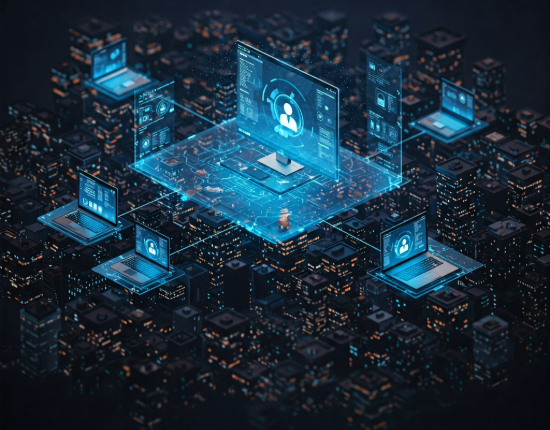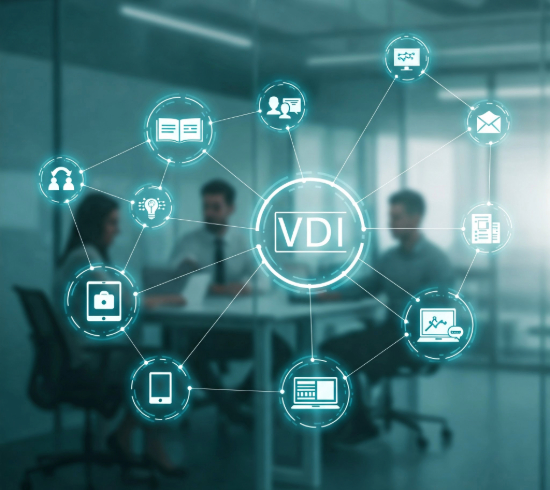
Virtual Desktop Infrastructure (VDI) Services in Oxford & London
Secure, Scalable Desktops in the Cloud – Work from Anywhere, Anytime
Struggling to support remote or hybrid workers? Tired of maintaining dozens of physical desktops? Network Assistance offers fully managed Virtual Desktop Infrastructure (VDI) solutions that give your staff secure access to business desktops—anytime, from anywhere.
VDI delivers powerful Windows desktop environments hosted on central servers or the cloud, eliminating the need for traditional PCs and giving you total control over access, data, and security.
What Is VDI?
Virtual Desktop Infrastructure enables users to connect to a virtual desktop environment hosted on a remote server. Rather than running software and storing files on individual machines, users log in to a centralised, fully managed Windows desktop that works across PCs, Macs, thin clients, or tablets.
Perfect for remote teams, BYOD policies, or organisations that demand high security and easy scalability.
Our VDI Solutions Include

Fully Hosted Virtual Desktops
We deliver secure, high-performance desktop environments hosted in the cloud or your local data centre—ready for access 24/7.

Multi-User Access & Role-Based Control
Each user has their own profile, permissions, and apps—ensuring security and productivity across departments.

Application & Data Centralisation
Run key software and store files on the virtual desktop—keeping everything secure, backed up, and centrally managed.

Secure Remote Access
Access desktops from any device using secure connections, multi-factor authentication, and encrypted tunnels.

VDI Setup & Migration
We design, deploy, and migrate your users from physical desktops to a managed VDI platform with minimal disruption.

Ongoing Management & Support
Our Oxford-based team monitors performance, handles patching, and provides direct user support as needed.

Virtual Desktop Infrastructure for Remote Workers
The virtualization of desktops and applications create a more flexible and secure business IT infrastructure. This allows you to quickly respond to changing business and end user needs, as well as reducing costs.
VMware’s Mobile Secure Desktop solution allows older desktops and applications to be moved into the cloud and delivered as a managed service. This makes processes more efficient, your data more secure and you save money!
By tying desktop environments to users and not devices, end users are free to access their data and applications from any qualified device whether in the office or half way around the world.

VDI for Branch Offices
Virtual desktop infrastructure allows a consistent and scalable desktop service to be delivered to remote and branch office workers.
Using a wide area network, branch office desktops maximise uptimes, simplifies remote desktop management and reduces the costs as a result.
- Provide consistent high performance desktop experiences
- Simplify desktop IT management and accelerate provisioning of remote desktops
- Ensure high availability
- Reduce desktop operating costs and travel to branch offices
Enable Flexible, Secure Work – Anywhere
Upgrade to VDI with Network Assistance and give your team consistent, secure desktop access wherever they are. Fewer IT headaches. More control. Better business continuity.
Benefits
Desktop Virtualization - Key Advantages

Desktop Management in VDI
Desktop virtualization allows you to have complete control and centralised management of all desktops.
Deployment of virtual desktops, administration, and desktop management is quick and easy, saving a tremendous amount of time and saving you money

Security in VDI
Security is a key advantage of VDI. Within a virtualised desktop environment, you have greater control of how desktops are secured. Images can be locked down from external devices and what is saved to the desktop can be completed controlled.
As sensitive data is stored on the server, if a device is lost or stolen the information is protected.

High Availability
Ensure seamless performance with High Availability in Virtual Desktop Infrastructure. Our solution minimizes downtime, enhances reliability, and keeps your workforce connected anytime, anywhere. Experience uninterrupted productivity with secure and scalable VDI services.

Flexibility
Prior to VDI, to roll out new software to specific users, you would have to look at their equipment and possibly upgrade hardware such as RAM. With a virtual desktop environment, you simply push out an image from a central location to the users in question.
Additionally, with a virtual desktop infrastructure, you have the ability to roll back desktops to different states.

Disaster recovery
In the unfortunate event of your office environment being unavailable, a virtual desktop infrastructure means that users can work seamlessly from another authorised device (such as a home PC, laptop, etc).

Lower cost of ownership
By sharing resources in a virtual desktop infrastructure, the lifecycle of a typical desktop is extended by many years.
